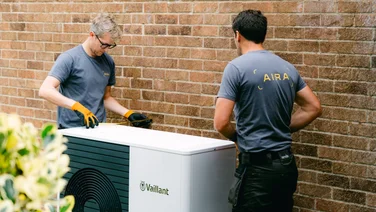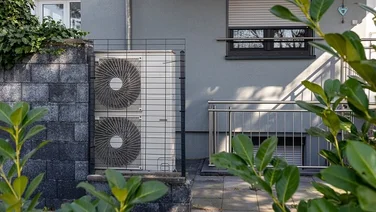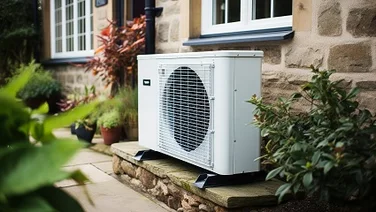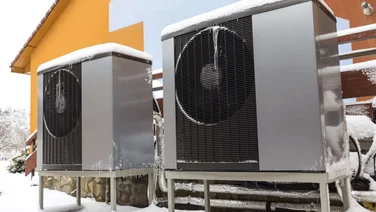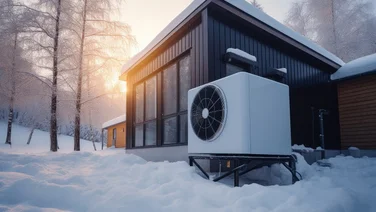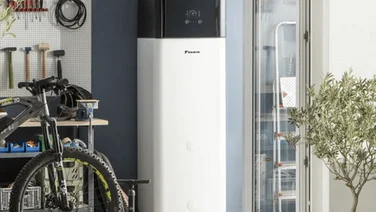We receive a small fee from trusted installers when you request a quote through our site. This helps us keep our content independent, well-researched and up to date – Learn more
- Choosing the best installer is a vital step in your switch to a heat pump
- Our 7-step checklist includes reading customer reviews and getting three itemised quotes
- We also reveal the questions you must ask before you hire a heat pump installer

Switching to a heat pump slashes your carbon footprint and future-proofs your home from energy price fluctuations, but what should you look for when you’re looking got the best heat pump installer for you?
In this guide, we’ll help you choose the installer that best matches your home and your needs. We’ll also reveal the questions to ask your potential installer, and the credentials you must check before you sign on the dotted line.
Heat pump installation is a fast-growing market, thanks in part to popular heat pump grants, and there’s much less information out there than for, say, choosing a solar panel installer.
But there’s plenty of variety between companies. Some are one-stop energy shops, while others are heat pump specialists. Some work with one heat pump model, while others offer a wide range.
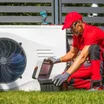
Get a free heat pump quote
Interested in installing a heat pump? Use the button below to hear from our trusted suppliers
Our 7-step checklist to choosing a heat pump installer
Rule one of hiring a heat pump installer: don’t rush it! Different installers suit different needs. Even the one that best suits your next door neighbour may be totally wrong for you. Here are the key factors to consider.
1. Know your heat pump needs
A good installer will run through the questions below before expecting a decision. We recommend giving these factors plenty of thought beforehand, though, so you’re not swayed by sales talk.
What’s your budget?
A heat pump including installation costs £10,000 or more, although £7,500 is covered by the current government grant for heat pumps, the Boiler Upgrade Scheme (BUS) – leaving £2,500. Set your top limit and stick to it.
Will you pay upfront or use financing?
Some installers have particularly good financing schemes, and some are especially helpful with grant applications.
What do you need your heat pump to do?
Do you need a hot water tank? Should your heat pump be compatible with your existing radiators? Do you need it to be particularly small, unobtrusive or quiet?
Make a wish list of all the functions you want (our best heat pumps guide will help), and check that potential installers can provide them.
What brand of heat pump do you want?
Different heat pump companies work with different heat pump brands. If you have your heart set on a particular model, make sure your potential installer can provide it.
What other installations are you considering?
Some installers are one-stop shops for a whole range of heating systems and renewables, while others are heat pump specialists. If you’re planning other installations in the future, it may be worth establishing a relationship with a one-stop shop such as Warma UK or Octopus Energy.
2. Know your installer options
Different companies excel in different areas. For example Aira Home has an outstanding lifetime warranty; Octopus Energy is particularly good value for money, and Warma UK is notably helpful when it comes to claiming grants.
These and other companies have other pros and cons too, so go through the details in our best heat pump installers list – and also check local providers.
An installer’s website should include details of the heat pumps they install, the other products and services they provide, and how their costs and warranties compare with the competition.
You’re unlikely to get an instant quote from any heat pump installer. Actual prices are based on lots of factors like the condition of your home and your existing heating system, which no installer can know in an instant.
How much does a heat pump cost?
An installed air source heat pump (ASHP) currently costs an average £10,000 including installation, according to our guide to heat pump costs. Installation accounts for around £3,000 to £5,000 of the cost.
The £7,500 BUS grant reduces an ASHP’s overall price to around the same you’d pay for a new gas boiler – but its lifespan is about double.
Ground source heat pumps (GSHPs) cost more to install, because the process is more labour-intensive. A GSHP system costs around £24,000 including installation.
3. Check qualifications
All installers of renewable energy systems must be certified by the Microgeneration Certification Scheme (MCS). MCS certification means that a company is technically competent, and uses products that meet the correct standards.
MCS certification is also about money – your money. Your installer will need to be certified in order to claim the BUS grant for you.
MCS certified installers should also be registered with a consumer protection scheme such as the Renewable Energy Consumer Code (RECC) or HIES consumer protection code. This means you’re protected if anything goes wrong.
To find out whether a particular heat pump installer is MCS certified, head to the MCS website, click ‘find a contractor’ and search for the company. If your installer plans to use a subcontracting company, make sure they carry the right accreditations, too.
You may also want to check the Companies House website to find out how long the installer has traded under its current name. This is a young industry and companies launch all the time, but a long track record will help give you peace of mind.
4. Read customer reviews
Don’t just take our word for it. The most authoritative reviews of all come from current and former customers of these companies.
First, find specific companies that meet your needs and serve your area. Start with Google, Checkatrade or our own list of the best heat pump installers.
Then go to Trustpilot and search for those companies by name. You can then narrow down the results by specifying key words such as “service”, “quote” and “grant”. Trustpilot’s category search function is hit and miss (search for “heat pumps”, for example, and it just lists companies with “heat pump” in their name), so avoid that.
Tap into the local grapevine, too. Friends and neighbours may have reliable recommendations, and an appeal on a local Facebook group may elicit some useful responses.
A local installer may not be high-profile enough to get into our list of the UK’s best, but their local knowledge and proximity could make them perfect for you.
5. Get three itemised quotes
Now it’s time to collect quotes. If you’re happy for us to recommend trusted installers who serve your area, use our free quote finder. Pop some brief details into it and we’ll ask a few hand-picked companies to get in touch.
Alternatively, approach three or four of the companies that impressed you in your research. None of them should send you an instant quote. Instead, they should offer to visit your home and assess your energy needs.
A good heat pump installer will then give you a fully itemised quote.
The quote should specify the price of your heat pump type and model; optional features such as monitoring systems; labour costs; and additional work such as plumbing adjustments or insulation.
It’s not just about price, though. Ask for pictures of the heat pump system your installer is suggesting, and get details of product specs and projected savings.
If budget’s a concern, ask about financing. Options like loans, grants and leasing programmes can help lighten the load.

6. Ask these questions before you hire
Most of your work is now done, but don’t just go for the cheapest quote. Before you sign anything, make sure you’ve got the answers to these questions:
- How long will the job take?
- How long will you be without heating and hot water? This shouldn’t be more than around two days.
- Will the same company carry out all the work, or will subcontractors be involved? If so, ask who they are so you can check their credentials.
- Are there any changes you can make to your property to reduce the overall bill and give you more choice over components? For example, can you buy a new hot water tank or radiators by yourself?
- Will the heat pump work with your existing electricity supply?
- Will the work comply with all relevant regulations – including current building regulations? Most heat pumps don’t require planning permission, but if you live in an older property it’s worth asking about this.
- What warranties are included in the quote? Ask about labour and performance warranties as well as manufacturers’ product warranties.
- How often should the heat pump be serviced, and will your installation company be able to do this?
7. Take your time
You’ve done your research, you’ve had your quotes, and you’ve asked all the essential questions. Now breathe. Don’t be pushed into signing anything while the sales rep is in the room. Compare your options in detail, and sleep on it.
An air source heat pump should last 20 years. Two decades of heating and hot water is a serious investment for your home, and a central part of your home life. A decision this big can’t be made overnight. Good luck!


